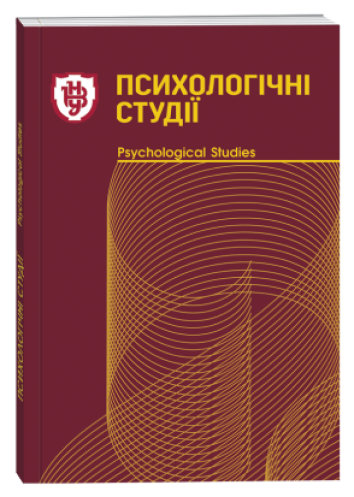ТЬЮТОРИНГ У ВИЩІЙ ОСВІТІ: ВПЛИВ НА АКАДЕМІЧНУ УСПІШНІСТЬ ТА ПРОФЕСІЙНИЙ РОЗВИТОК
DOI:
https://doi.org/10.32782/psych.studies/2024.1.26Ключові слова:
тьютор, тьюторант, тьюторинг, індивідуалізація, стратегії тьюторства, консультуванняАнотація
У статті представлено особливості реалізації тьюторингових стратегій у вищій освіті, розглянуто їх вплив на академічну успішність та професійний розвиток здобувачів освіти, розкриття індивідуально-творчого потенціалу майбутніх фахівців. Дослідження містить обґрунтування доцільності використання тьоторингу в умовах технологізації цілісного освітнього процесу для набуття необхідних професійних компетенцій. Тьюторство – це додаткова необхідна складова, що доповнює основний навчальний процес; тьютор – творча особистість, керівник навчальної групи, який проводить групові заняття-практикуми, надає психологічну підтримку й індивідуальну допомогу студентам у вирішенні навчальних та особистих проблем, пов’язаних з навчанням; здійснює професійну орієнтацію та консультування. У статті зазначено, що саме тьюторинг, поєднуючи процеси забезпечення індивідуалізації освітнього простору, спираючись на формування усвідомленого запиту особистості до навчання, суб’єктність освітньої діяльності, є тією освітньою технологією, яка найбільш удало інтегрує традиційний та інноваційний підходи в освітньому процесі. Описано пріоритетні професійні компетенції здобувача освіти, формування яких можливе у взаємодії «тьютор-тьюторант»: адаптивність, гнучкість, готовність допомагати, особиста ефективність в складних та нестандартних професійних ситуаціях, відповідальність, організованість та вміння планувати, саморозвиток та особисте зростання, здатність до пошуку рішень, ефективна комунікація, стрес-менеджмент, тайм-менеджмент, володіння сучасними інформаційними технологіями. Запропоновано методи та техніки тьюторингу, що передбачають розкриття змісту і послідовності етапів тьюторської діяльності, забезпечення освітніх потреб для формування стійкого інтересу здобувачів освіти, консультативної підтримки, спільної рефлексії проміжних та остаточних результатів спільної діяльності.
Посилання
Барієва Е.І., Топорков Т.В. Методи тьюторської діяльності у навчанні інформатики. Ukrainian Journal of Educational Studies and Information Technology. 2018. № 6 (3), С. 1–11. https://doi.org/10.32919/uesit.2018.03.01
Дем’яненко Н.М. Методологія тьюторингу з позицій психологічного знання. Науковий вісник Кременецької обласної гуманітарно-педагогічної академії ім. Тараса Шевченка. Педагогічні науки. 2023. № 17. С. 7–17. https://doi.org/10.32782/2410-2075-2023-17.1
Коробова І., Нікіфорова В., Лікарчук Л. Роль тьюторства в опануванні германськими мовами у вищій школі. Вісник ХНУ імені В. Н. Каразіна. Серія: Іноземна філологія. Методика викладання іноземних мов. 2021. № 93, С. 76–83. https://doi.org/10.26565/2227-8877-2021-93-10
Чаюн Н.С. Тьюторська діяльність: сутнісні основи, практика, перспективи. Вчені записки Університету «КРОК». 2023. № 2(58), С. 8–19. https://doi.org/10.31732/2663-2209-2020-58-8-19
Ajrina Hysaj, Abeer Elkhouly, Ayesha Wasim Qureshi, Nidhal Abdulaziz. A Study of the Impact of Tutor’s Support and Undergraduate Student’s Academic Satisfaction. American Journal of Humanities and Social Sciences Research (AJHSSR). 2019. Volume 03, Issue 12, pp. 70–77. https://www.researchgate.net/publication/348155529_Study_of_the_impact_of_tutor's_support_and_undergraduate_student's_academic_satisfaction







